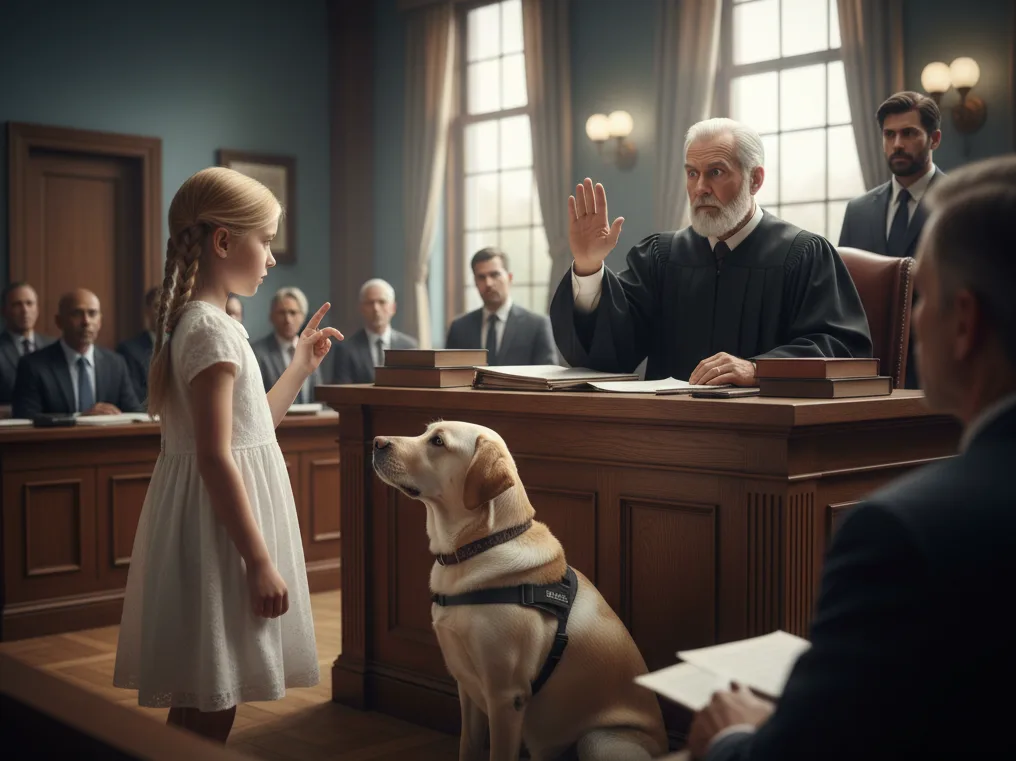The courtroom fell into complete silence as Judge Merritt noticed the girl’s fingers twitch—a small, deliberate signal toward the golden retriever beside her chair. The dog rose at once, moving with purpose, its focus locked on the sealed evidence bag at the front of the room.
Scout padded forward, nails clicking faintly against the tile. He stopped beside the table and barked once—sharp, deliberate, commanding. Merritt’s gavel struck wood, echoing through the chamber. “Order,” he said, though curiosity edged his tone more than anger.
The child didn’t flinch. Her gaze stayed fixed on the dog, her lips parting slightly as though she knew exactly what he was doing. The courtroom’s air changed—tense, electric, alive with a question no one could yet name.
“Someone restrain that animal,” the prosecutor snapped. The bailiff moved forward, but the dog didn’t retreat. Instead, Scout sniffed the air again, nose pressed toward a metallic tag sealed in plastic among the evidence. His tail remained perfectly still.

“Scout,” the girl mouthed. It was barely a breath. Merritt caught it anyway. He felt something stir inside him: the faint, unfamiliar tug between doubt and instinct. This wasn’t chaos. It was intent. Something meaningful hid beneath the surface.
This was the St. Helena Orphanage case—the fire that consumed half the west dormitory, took one life, and left a city arguing over blame. It had started as a tragedy and grown into a scandal, money and morality burning together in public view.
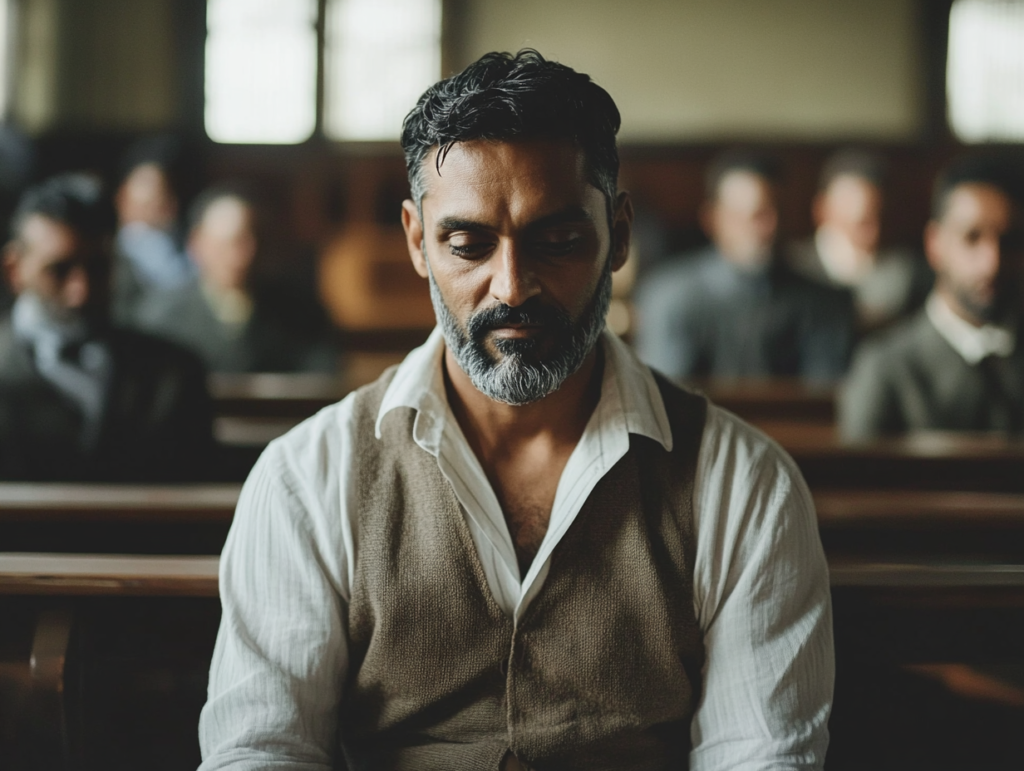
The accused, Jacob Wells, a maintenance worker, sat quietly at the defense table, shoulders drawn in. He wasn’t the picture of guilt. He looked exhausted, a man buried beneath circumstances too heavy to lift.
The prosecution called it greed. The papers called it betrayal. He was accused of torching the orphanage after stealing fifty thousand dollars raised for the children’s new library wing. Every headline had already convicted him.

The girl—Lila Harper—was the only eyewitness. She’d been found unconscious in a smoke-filled hallway, rescued moments before the roof collapsed. Her voice had been taken by the fire’s ash, leaving only silence, and the dog who now spoke for her.
Merritt studied her from the bench. Small frame, soot-dark hair, eyes too old for her years. Fragile, yes, but anchored. “Ms. Cooper,” he said finally, “please explain why your client’s dog seems to be giving evidence before your witness can speak.”

The defense attorney rose calmly, smoothing her sleeve as the courtroom settled. “Scout isn’t just a pet, Your Honor,” she said. “He’s a certified rescue and emotional-support dog. The child relies on him to communicate.” Her voice carried assurance, though Merritt caught a flicker of nerves beneath it.
Merritt raised an eyebrow. “Communicate?” he repeated, pen poised above his notes. He’d heard of emotional-support animals, but never one disrupting a federal proceeding. The attorney nodded. “Yes, sir. She’s learned certain signals to calm herself. Sometimes he reacts instinctively when she’s anxious.” Merritt considered that carefully.
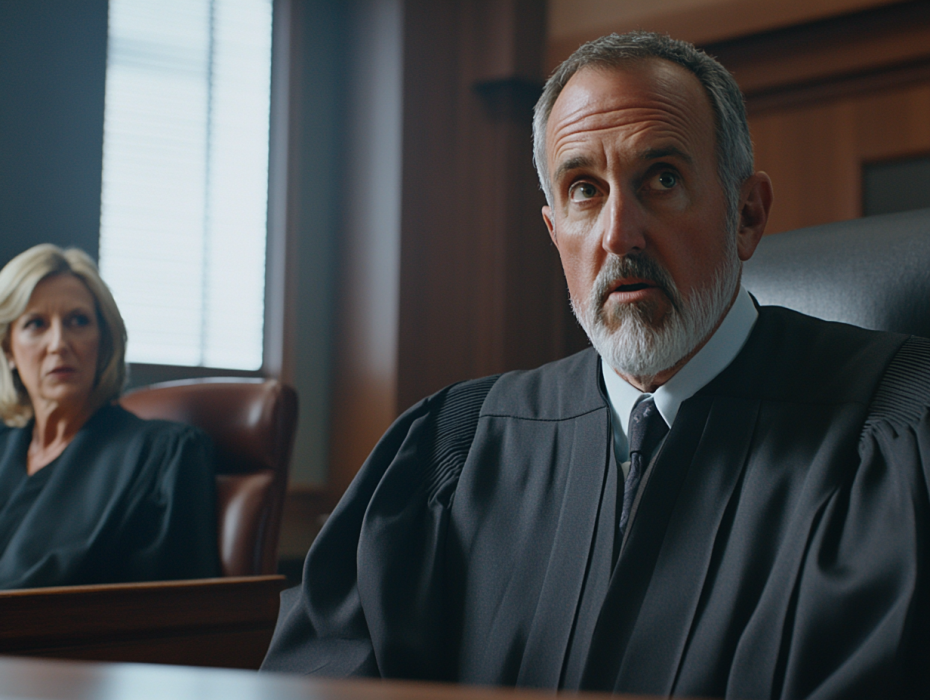
The prosecutor, Lowell, gave a derisive snort. “Then perhaps the animal senses how absurd this defense is.” The courtroom tittered, but Merritt’s glare silenced them instantly. He had no patience for theatrics, and least of all from men who mistook cruelty for confidence.
“Sit down, Mr. Lowell,” Merritt said flatly. “You’ll get your turn.” The reprimand landed with the dull thud of finality. Lowell sank back into his seat, lips tightening. Merritt turned again to the child, who still hadn’t lifted her gaze from the leash looped tightly in her hands.

Beyond the glass partition, camera flashes flared like heat lightning. The case had drawn more than curiosity. It had drawn outrage. Donors, trustees, parents, and politicians all wanted someone to blame. For now, that someone was sitting at the defense table.
Lowell straightened his papers. “On the night of the fire,” he began, “the orphanage vault contained fifty thousand dollars in fundraiser cash. By morning, it was gone. The fire destroyed the west wing and, with it, the institution’s reputation.”

“The defendant’s keycard shows entry at nine forty-three p.m.,” Lowell continued, pacing slowly before the bench. “No exit recorded. Minutes later, the fire began in the adjacent wing. He had access, motive, and time.”
Merritt noted the phrasing—no exit log. Simple on paper, damning in sound. Yet the detail it contained felt incomplete, like a note missing its final chord. He circled the phrase on his pad, marking it for later.
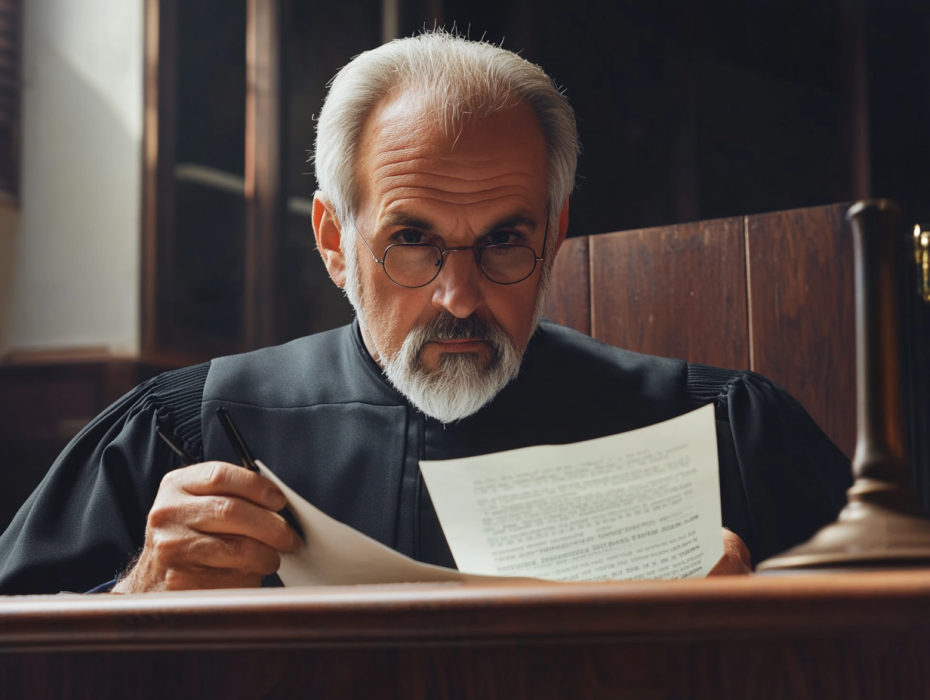
“The vault handle bore his fingerprints,” Lowell said. “The security footage was lost when the power failed.” He paused, letting silence imply certainty. Merritt observed quietly that Lowell enjoyed performance. Confidence, he thought, often hid the places doubt should live.
His gaze returned to the girl and the dog. The accused looked bewildered, almost defeated. Scout lay still but watchful. Merritt leaned back, watching Lowell’s performance unfold, wondering whether his confidence came from evidence or from his intention to win at any cost.

“Mr. Wells had motive,” Lowell declared confidently, pacing before the bench like a man certain of his narrative. “He was in debt—months behind on rent. Access and opportunity converge on him, Your Honor.” His voice carried that rehearsed balance between outrage and conviction.
“Who else had access?” Merritt asked. His tone was neutral, investigative—more curious than confrontational. He’d learned long ago that truth often emerged from calm, not heat. He wanted to unravel this carefully.
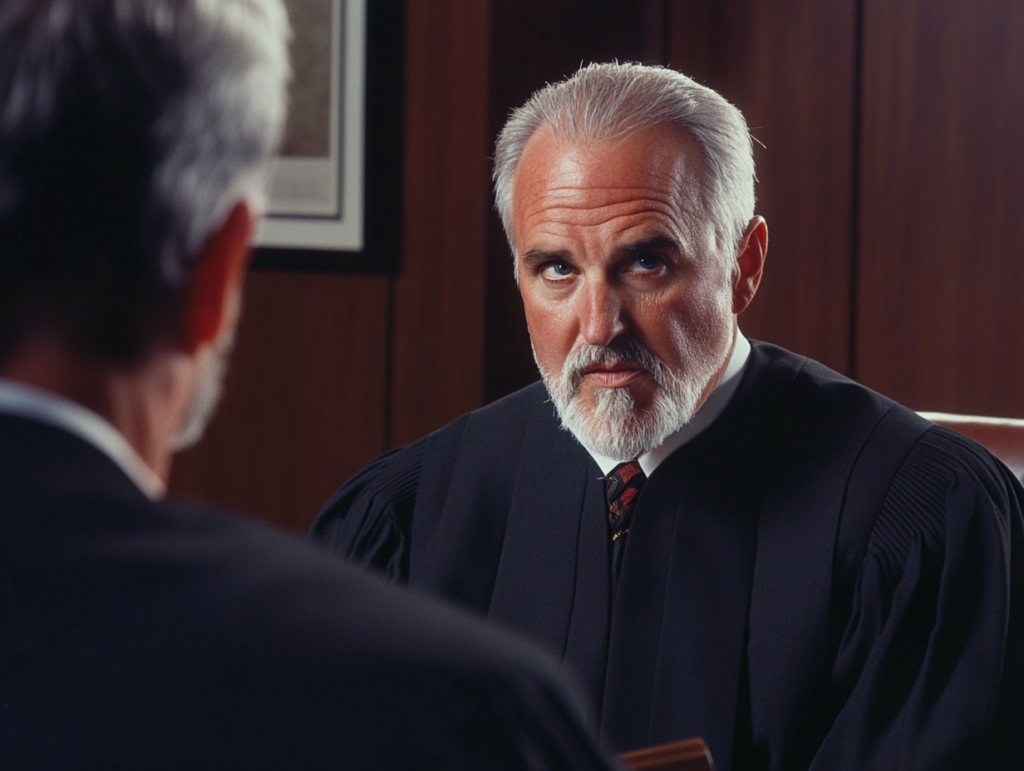
“Only one other person,” Lowell replied, tapping his notes. “Leonard Henson, trustee of the orphanage board.” The judge noted it down. It did seem that the case against the accused was very bad indeed.
“And he’s the one who discovered the fire?” Merritt clarified. “Yes, Your Honor,” Lowell said. “He was the first to raise the alarm. Called the fire department himself.” Merritt jotted that down—finder of the fire.

Ms. Cooper stood. “Jacob had already left before the blaze started. He was working on a breaker fault near the east wing. The timing doesn’t fit.” Her calm contrasted Lowell’s momentum. It was like a surgeon stepping into a brawl.
Lowell countered immediately. “His keycard never logged a ‘log off.’ The system shows him still inside. The system doesn’t lie.” His voice rose slightly, as though louder volume equaled proof.

Merritt adjusted his glasses, glancing at the printouts. The columns of time stamps and digital entries stared back, sterile and unwavering. “Could the system have been tampered with?” he asked evenly.
“Impossible,” Lowell said without hesitation. That word again was too confident, too final. Merritt wrote it in the margin, circling it once. Impossible was a word that often broke before the verdict did.

Ms. Cooper folded her arms, the faintest smile ghosting across her face. “Technology is made by people, Mr. Lowell. And people make mistakes.” The courtroom tensed as the two advocates exchanged silence instead of words.
Scout stirred under Lila’s bench, tail flicking once, gaze fixed on the evidence pouch. Merritt noticed the motion, quiet but deliberate. Dogs, he thought, didn’t understand words like impossible. They only understood wrong when they sensed it.
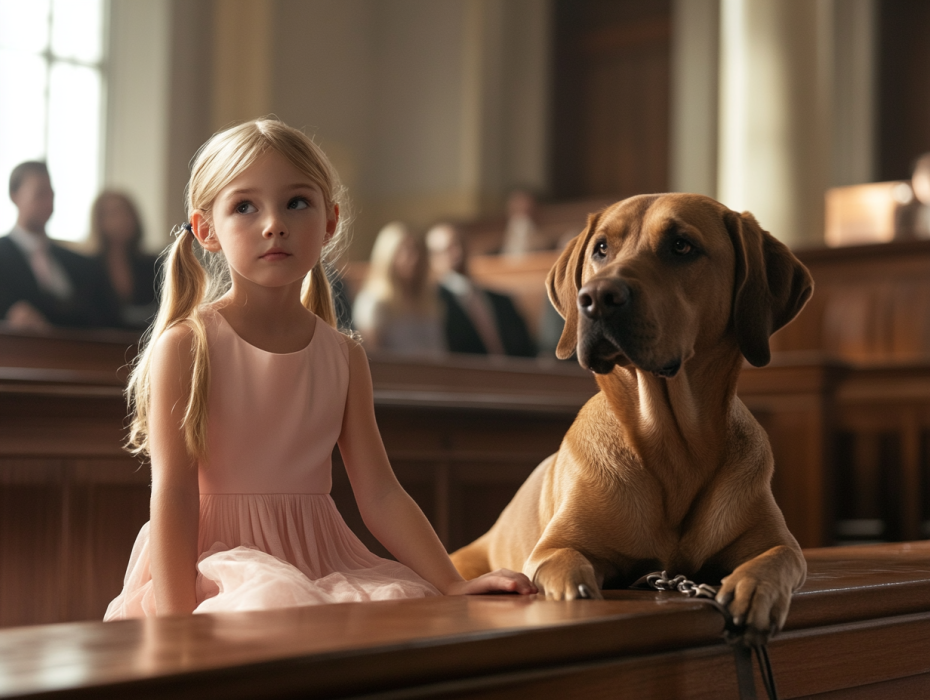
When Lila approached the witness stand, the noise in the gallery fell away as if swallowed by the air itself. Scout padded beside her, each movement measured, deliberate, protective. Merritt felt the courtroom hold its collective breath.
Ms. Cooper crouched to her level, voice softened to match the child’s silence. “Lila, do you remember that night?” she asked. The girl nodded, her small hands folded neatly in her lap.
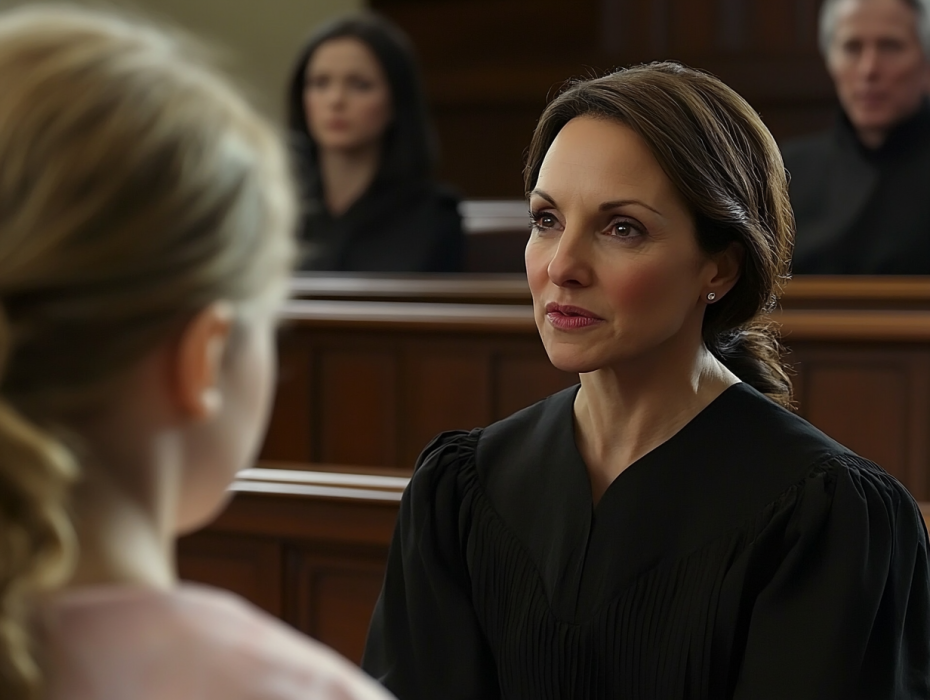
“Did you see Jacob Wells?” Cooper asked next. Lila nodded again—two fingers raised like a signal rehearsed countless times. “Yes,” Cooper translated for the record, “before lights-out.” The rhythm between them was gentle, practiced, human.
“And after?” Cooper’s tone was cautious and patient. Lila shook her head firmly. The motion was small but certain. Everyone in the room understood her meaning without her having to say the words aloud.

Merritt observed her closely. Trauma made witnesses unreliable, but sometimes, it also stripped away the need to lie. The girl didn’t fidget, didn’t seek approval. She simply remembered, and remembering was its own quiet defiance.
“Did you hear anything?” Cooper asked. Lila hesitated, then tapped twice on her palm. The sound was barely audible, but it made an impression. Scout lifted his head, issued one soft bark, and lay still again.

A ripple passed through the room. Merritt’s gavel rested quietly in his hand. “You may explain that,” he said to Cooper. Cooper faced the audience before saying what she did.
“She heard a voice,” Cooper said, glancing toward the bench. “Of another person.” Her voice carried a weight beyond the words. Cooper’s body language was firm and exact; she was merely presenting facts as they emerged.

Lowell’s pen froze mid-note, a pause too brief to escape Merritt’s notice. He had expected one voice, of the one the accused. Another voice complicated things. Merritt leaned forward, every inch the impartial listener.
“A voice,” Merritt repeated softly, writing it in his notes. “Not one.” The words echoed faintly against the walls, more observation than judgment, but enough to remind everyone that the story had just changed shape.

“Could you recognize it?” Cooper asked softly, her tone low enough to keep the moment intimate despite the courtroom’s walls. Lila hesitated, then raised both hands and mimed turning a circular dial, her small fingers moving with slow, certain precision.
Cooper turned toward the bench. “It was someone at the safe,” she said, translating the gesture. The statement landed with quiet weight. Merritt felt the mood shift again—tiny truths, carefully pieced together, gaining shape.

Lowell rose, his voice clipped. “Your Honor, this child’s memories are fragmentary at best. We can’t build a case from gestures and guesses.” His words carried impatience, but also defensiveness.
Merritt didn’t look up from his notes. “Memories,” he said evenly, “are allowed to be fragmentary, Mr. Lowell. They’re still evidence.” The pen in his hand didn’t stop moving. Even fragments, he knew, could complete a puzzle.

Cooper leaned closer to the stand. “Did Jacob go near the safe?” she asked. The question came gently, as though afraid to disturb the memory itself. “Was it his voice you heard?”
Lila shook her head firmly. The motion was decisive, unhesitant. It was clear that Lila was sure she did not hear Jacob that night. A collective gasp ran across the room.
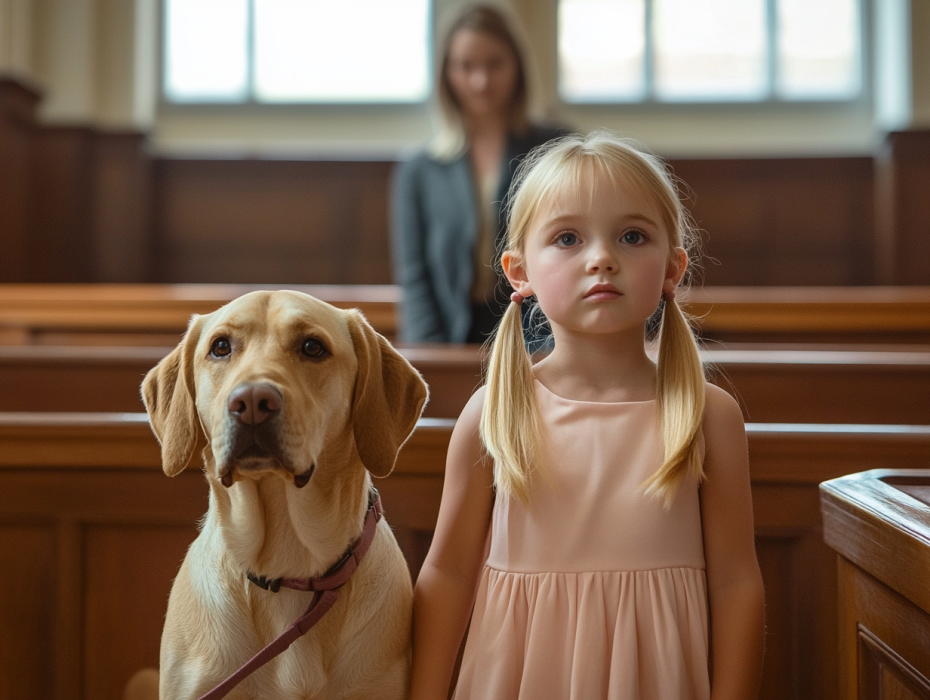
Scout sat taller beside her, his posture stiff, attention unbroken. Merritt’s unease deepened; there was a faint hum beneath the courtroom’s stillness. The dog wasn’t restless, but waiting for something to happen. He sensed the tension the humans hadn’t yet named.
“Lila,” Cooper said, pointing toward the sealed metallic tag on the evidence table. “Do you know what that is?” Her tone carried both invitation and care.

Lila’s expression changed. Merritt detected recognition, faint but certain. She nodded slowly, her hand hovering over Scout’s back. His nose twitched, drawn toward the plastic envelope as though memory itself had a scent.
“She saw it,” Cooper explained, looking at Merritt. “Before the fire.” The judge didn’t reply. He simply made another note, the words neat and steady: Tag seen before ignition.
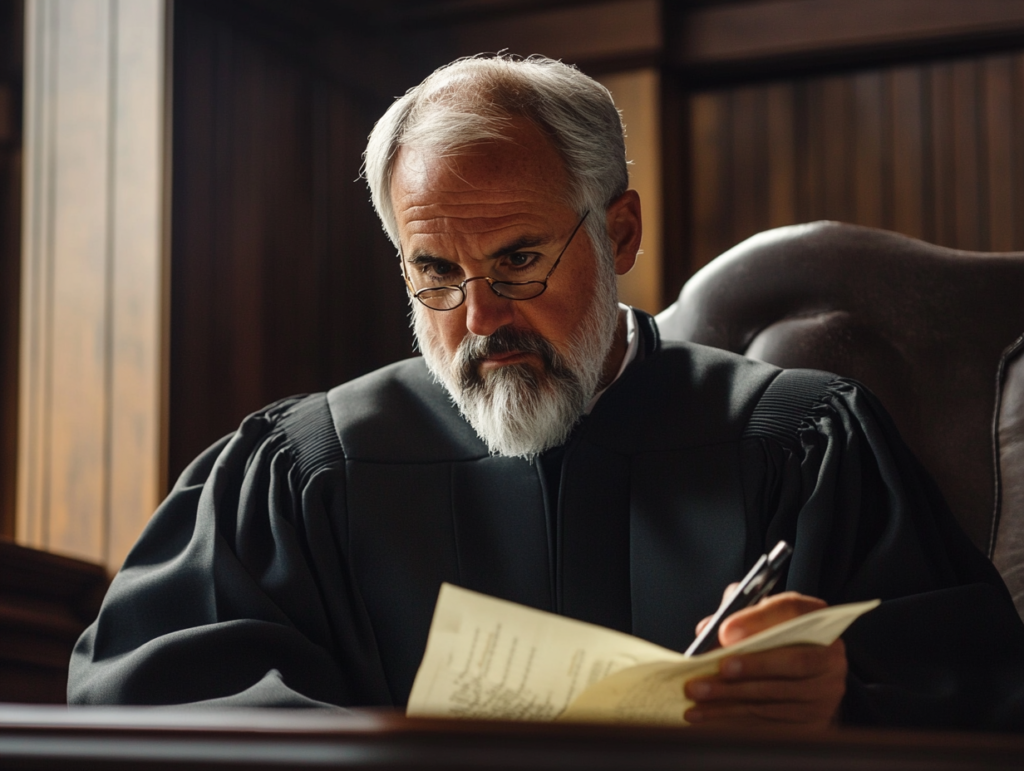
During recess, Merritt sat alone at the bench, reviewing the evidence log under the dimmed skylight. Each column of data told the same story: Jacob’s card entered the building at 9:43 p.m., but no exit was recorded. But another entry caught his eye—Admin Access 03.
It appeared exactly ten minutes before the blaze. There wasn’t any name, user ID, or digital signature. The line was clean, empty, ghostlike. Merritt frowned. “Unassigned,” he murmured. In systems like this, “unassigned” normally meant hidden.
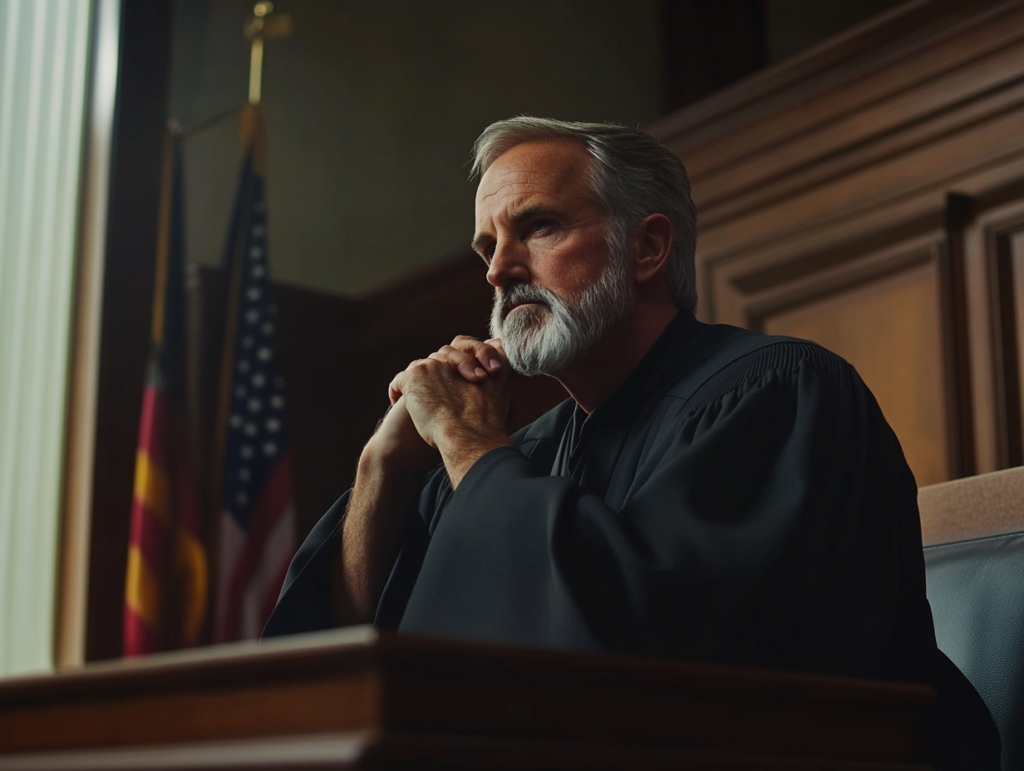
He leaned back, fingertips pressed together. Someone who wasn’t meant to be there had moved through that system, unseen but traceable by absence. It wasn’t proof yet, but it was enough to shift the ground beneath the prosecution’s certainty.
When the court reconvened, Leonard Henson took the stand. He looked every bit the professional trustee. He was dressed in a gray suit, his posture calm, and he was poised, the kind of poise money bought through reputation. Merritt regarded him carefully.
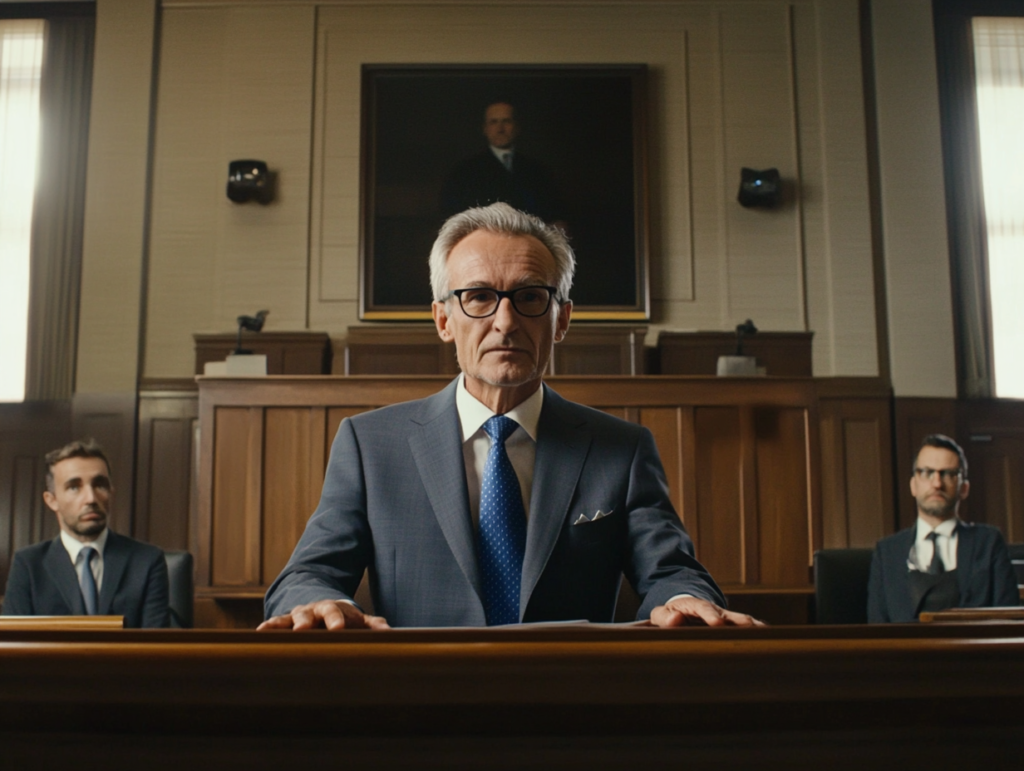
“You oversee building maintenance and security?” Cooper asked. “I do,” Henson said smoothly. The confidence was automatic, born from habit rather than defense.
“And you hold an override key for the alarm system?” she continued. “Correct,” Henson said. “It’s required for board-level access. Only two exist—the director’s and mine.”

“Could such an override erase keycard data?” Cooper asked, eyes steady. The question was simple, but its weight pressed on every word.
“Not erase,” Henson replied. “But suspend temporarily during maintenance.” His voice didn’t falter. He smiled slightly, as though anticipating approval for his precision.
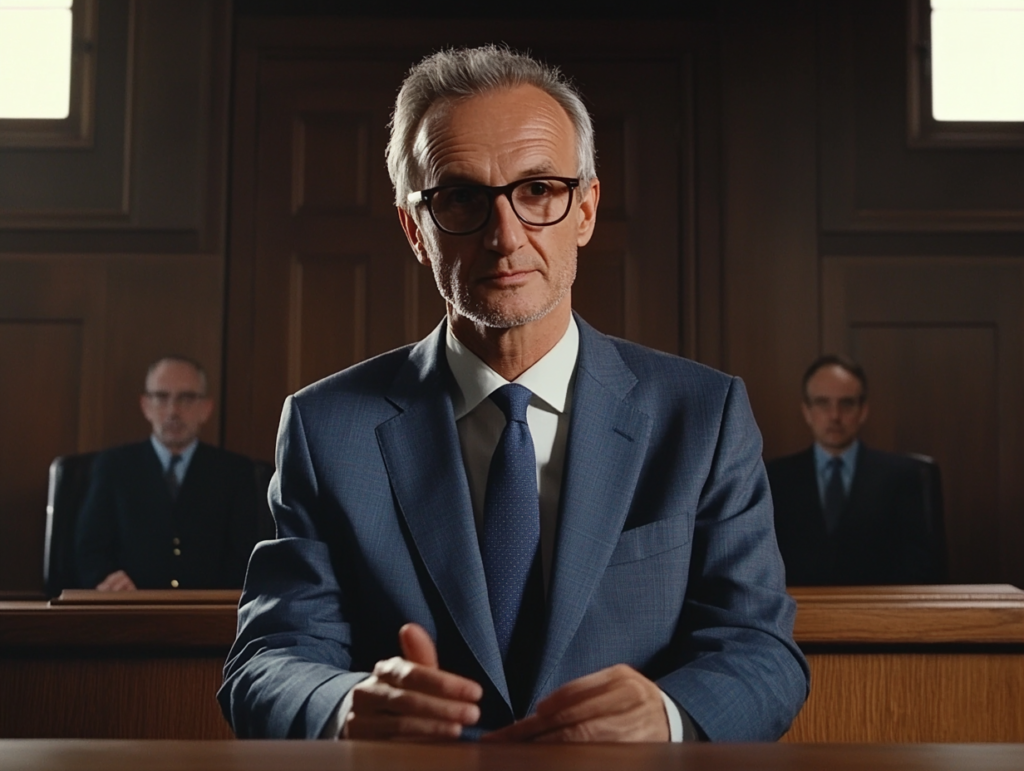
Merritt listened without judgment, but the gears behind his calm expression began to turn. A system override. A missing log. An accident born from someone else’s certainty.
Beneath the bench, Scout let out a faint, low, focused whine. Merritt made a small note in the margin of his pad: Dog—what is it reacting to? The girl’s hand tightened around the leash. Silence followed, sharp and telling. The court was adjourned for the next day.
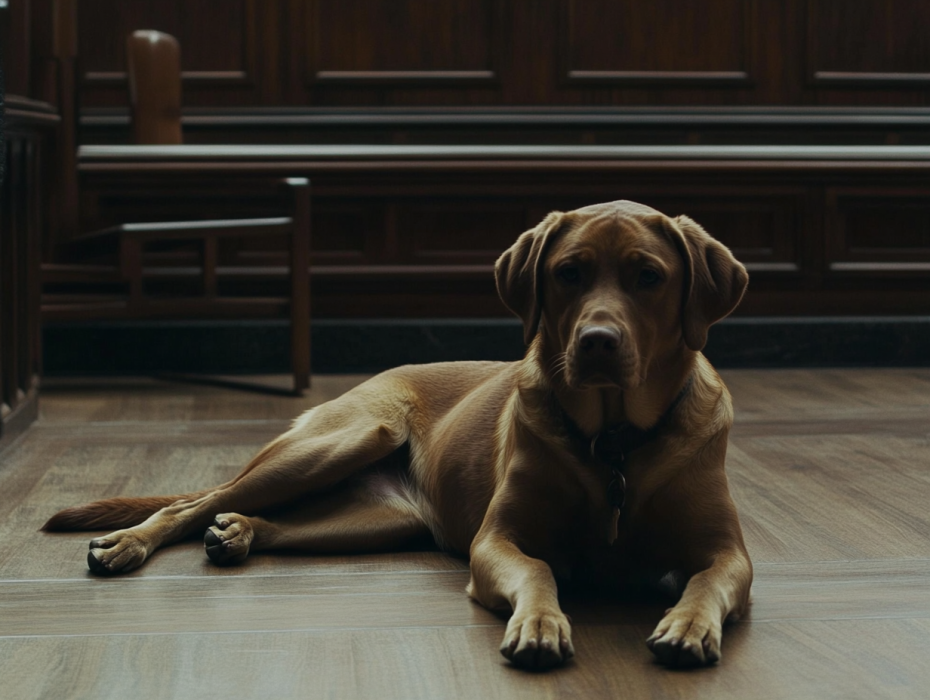
The following morning, sunlight broke through the courthouse windows in long, cold strips. The air felt cleaner, more expectant. Ms. Cooper rose. “Your Honor, the defense requests to recall the witness for just a few more questions.” Merritt nodded once. “Proceed.”
Lila stepped forward again, Scout padding faithfully beside her. The child looked steadier now, her silence deliberately suspended until the right moment. Merritt felt the room tighten, the unspoken understanding that something final waited just ahead.
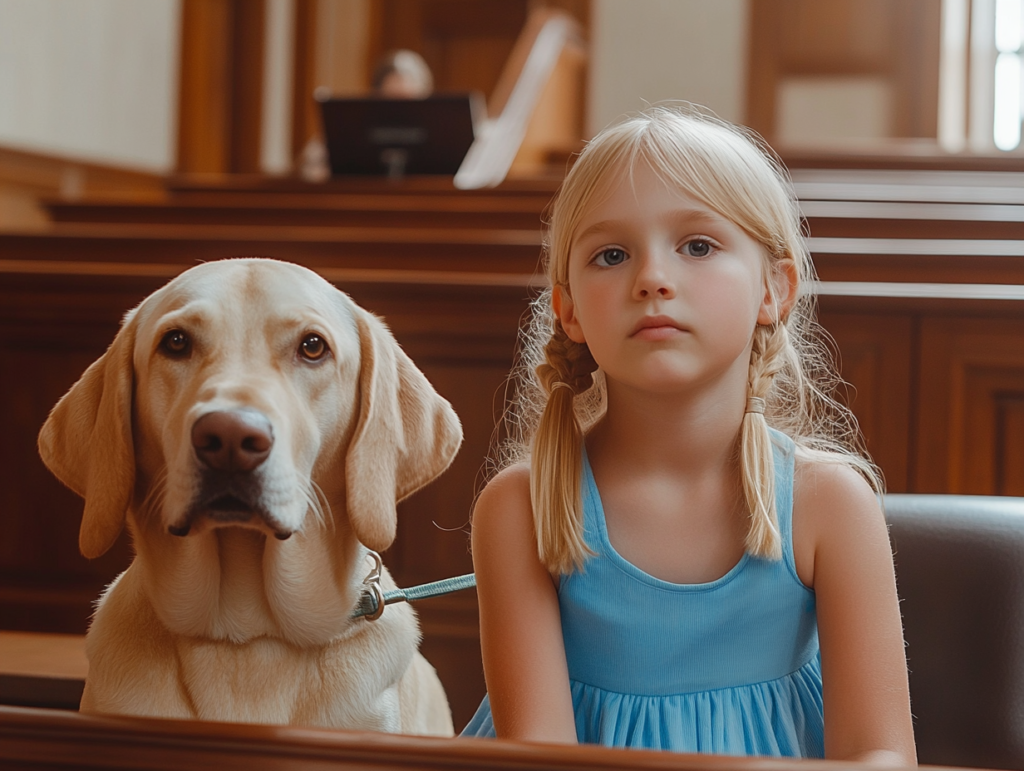
“Lila,” Cooper began gently, “you saw Jacob that night, correct?” The girl nodded. “And he left before the fire?” Another nod—simple, unflinching. Merritt noted the composure in her eyes; children, he thought, often remember truths adults edit out.
“You heard a voice afterward?” Cooper asked. Lila tapped Scout’s collar once. The retriever barked softly—one sound, clear as punctuation. The memory hung between them, more credible than speech.

“Did you see what they left behind?” Cooper’s tone was almost a whisper. Lila hesitated, then bent to touch the dog’s fur. Scout stood, nose lifting toward the evidence box, muscles taut with recognition.
“That metal tag,” Cooper said quietly. “It was found near the burned alarm panel.” The words drew murmurs across the gallery; the small object suddenly seemed enormous.

Lowell shot to his feet. “Those tags are all identical! Jacob’s access fob matches this exactly.” His voice cracked slightly under its own insistence.
“Or anybody else who had access,” Cooper countered evenly. She didn’t raise her voice. She knew she didn’t have to shout to make her point clear. The suggestion itself reshaped the room’s silence.
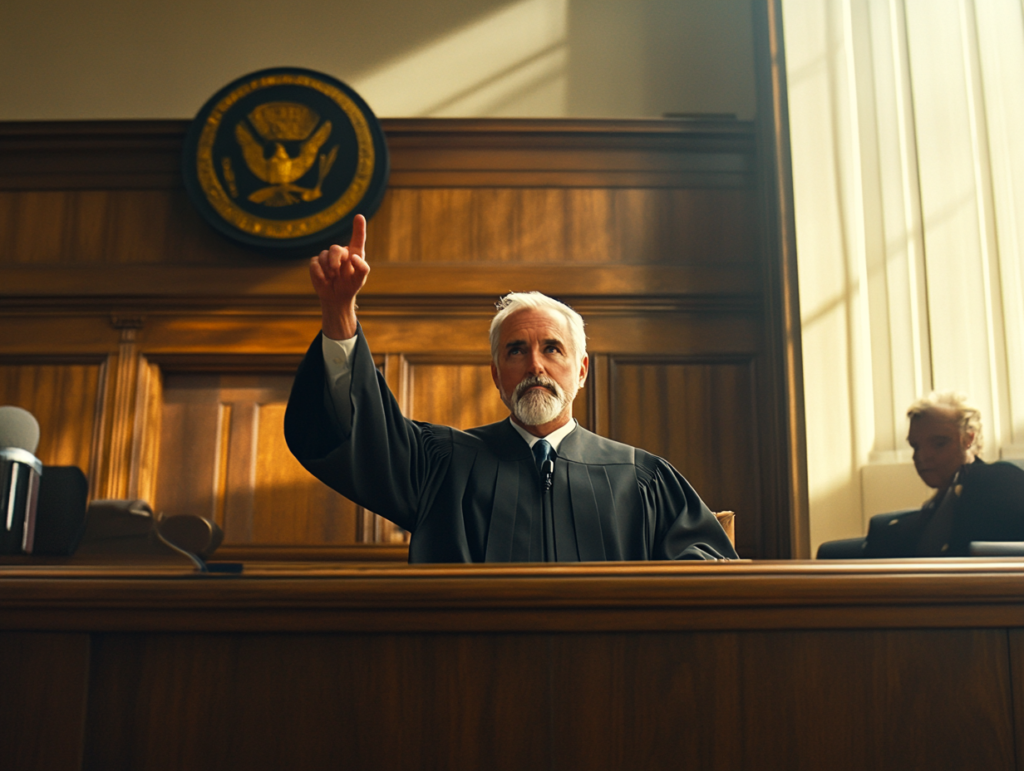
Merritt lifted a hand for calm. “We’ll confirm before we conclude,” he said. His tone stayed neutral, but the balance in the air had already shifted.
Scout lowered himself again, eyes never leaving the evidence. The courtroom waited, a hundred breaths held at once. Merritt sensed what everyone else felt but couldn’t yet name—the thin, trembling edge between coincidence and confession.
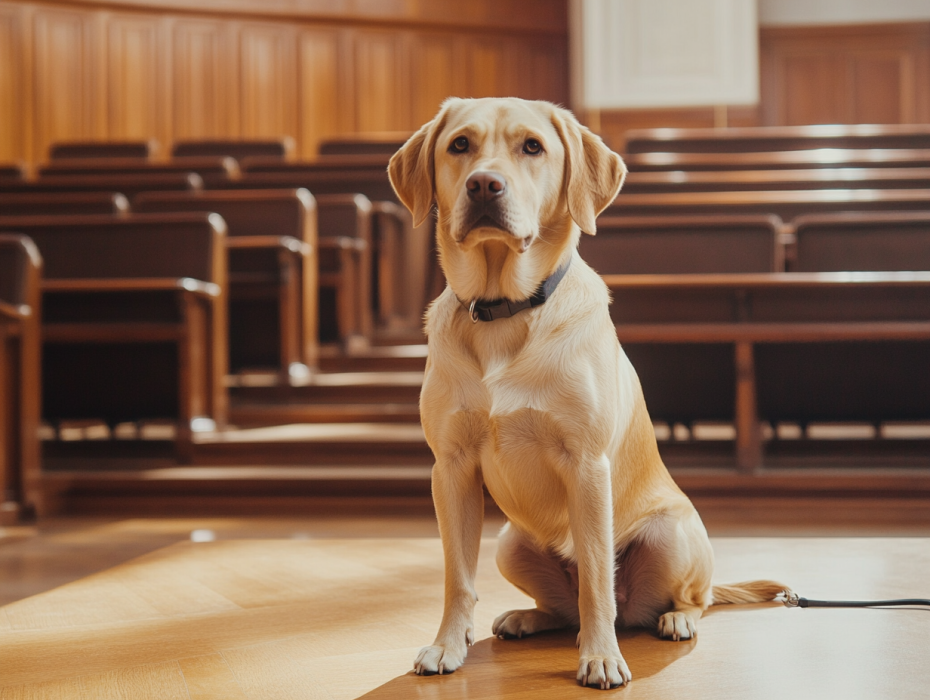
The bailiff carried the charred tag to the center table, placing it beneath the courtroom light. Its metal surface was warped but legible enough to reveal faint letters: Admin Acc….. The implication of the visible word was clear.
Merritt adjusted his glasses. “Mr. Henson,” he said evenly, “you testified that only a limited number of these exist. Correct?” The silence that followed was long enough to become its own answer.

“Yes,” Henson said at last. “Mine, the director’s, and a backup stored in the vault.” His words arrived rehearsed, but the rhythm of confidence faltered near the end.
Cooper stepped forward. “The backup was recovered intact,” she said. “The director’s is locked away. That leaves yours.” Her tone was measured—neither accusation nor relief, just precision.

Henson’s expression tightened. “I may have misplaced it,” he said. The lie was too calm, too clean. Merritt watched the surface of that composure begin to ripple.
“For the record,” Merritt said, voice steady, “were you in the building before the fire?” “Briefly,” Henson replied. “A systems check earlier that evening.”

“At nine forty-three?” Merritt asked quietly. The question landed like a gavel strike. Silence answered him. Not denial—just absence, the kind guilt rarely fills.
Scout rose, nose pointed directly toward Henson, then sat again, motion complete. Merritt didn’t react outwardly; he only wrote in his notebook: Instinct precedes confession.

Hours later, investigators confirmed what instinct had already proven. Henson had disabled the alarm using his override fob, intending to retrieve the fundraiser cash after hours. When a faulty wire sparked the blaze, his silenced system delayed the alert until half the building was lost.
The confession came quietly at the precinct. No theatrics, no denials—just exhaustion. Jacob Wells was exonerated. The city’s outrage softened into relief. For Merritt, the outcome was neither victory nor spectacle, only balance restored.

When the verdict was read, he glanced at the girl and her dog. “Case dismissed,” he said softly. Scout lay down beside her chair, tail brushing the marble floor, a small, steady rhythm in a courtroom finally returned to peace.
